|
|
|
Sort Order |
|
|
|
Items / Page
|
|
|
|
|
|
|
| Srl | Item |
| 1 |
ID:
131984
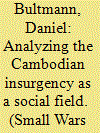

|
|
|
|
|
| Publication |
2014.
|
| Summary/Abstract |
This article investigates power practices in the Cambodian insurgency after 1979 as being part of a social field. There are various types of power practice being exercised by commanders aiming at making soldiers disciplined inside the insurgency. The hypothesis explaining these variations being proposed here is that the type of power being exercised depends on the habitus of the respective commander. Power practices are shaped by the incorporated classificatory discourse of commanders on good soldierhood and leadership. Thereby, armed groups can be analyzed as a social field in which practices are always relational and part of symbolic struggles between different commanders.
|
|
|
|
|
|
|
|
|
|
|
|
|
|
|
|
| 2 |
ID:
131985
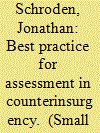

|
|
|
|
|
| Publication |
2014.
|
| Summary/Abstract |
In September 2011, the Commander of the International Security Assistance Force (ISAF) in Afghanistan directed the Afghan Assessment Group to redesign the way in which ISAF was assessing the status of the war, and to be 'revolutionary' in so doing. The resulting assessment paradigm was novel, non-doctrinal, and effectively addressed the unique complexities of the counterinsurgency in Afghanistan and the needs of the ISAF Commander. It had a two-tier structure consisting of both strategic and campaign assessments. The former focused on answering a set of strategic questions in narrative, analytic form to address the strategic environment, while the latter used a set of standards and accompanying narrative responses to gauge accomplishment of campaign tasks. Both tiers captured the current state of the war while maintaining an eye on future challenges and opportunities. The two assessments and their associated processes were designed to stimulate discussions leading directly to decisions by senior leaders on actions they could take, direct, or request. While any assessment paradigm will have advantages and disadvantages, an examination of the pros and cons of this assessment paradigm makes clear that it should be considered a 'best practice' in the field of counterinsurgency assessment.
|
|
|
|
|
|
|
|
|
|
|
|
|
|
|
|
| 3 |
ID:
131978
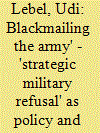

|
|
|
|
|
| Publication |
2014.
|
| Summary/Abstract |
The study shows how 'strategic military refusal' in Israel developed as a rational and institutional means to influence security policies. As opposed to the perspective that sees military refusal as a spontaneous individual act, the study illustrates how organizations operate to distribute military refusal in order to pressure decision-makers to change their military policies. This strategy has proven to be effective when the military is involved with groups that threaten it with refusal - which threatens the military's operational ability and its official and apolitical image. These include soldiers whose civilian authorities, rather than their military commanders, are perceived as an epistemic authority regarding security issues. The case study refers to the impact of strategic military refusal in Israel on security policies and the military doctrine. This was influenced by leftist groups, which, although they belonged to the parliamentary opposition, had dominant presence in the military ranks. Furthermore, the study examines the effect of the use of strategic military refusal on the model of military recruitment.
|
|
|
|
|
|
|
|
|
|
|
|
|
|
|
|
| 4 |
ID:
131979
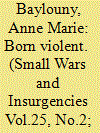

|
|
|
|
|
| Publication |
2014.
|
| Summary/Abstract |
We know little of the internal governing practices of non-state actors once in control of territory. Some territories have witnessed the establishment of new institutions of public goods remarkably similar to state institutions. This article compares four armed political parties governing territory during the Lebanese civil war. These non-state violent actors established complex political and economic institutions and administrative structures. Despite the wide range of ideologies and identities of these actors, they all converged in their institutional priorities, although not in their capacities or the particular ways of achieving those priorities. Data from interviews and the actions of the armed political parties suggest a combination of ideology and desire for control is causal in generating public institutions, partly attributable to the high degree of citizen activism marking the Lebanese case.
|
|
|
|
|
|
|
|
|
|
|
|
|
|
|
|
| 5 |
ID:
131980
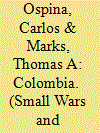

|
|
|
|
|
| Publication |
2014.
|
| Summary/Abstract |
From 1965 to the present, Colombia has been confronted by the insurgency of the Revolutionary Armed Forces of Colombia (FARC). The threat reached a new level in 1996 with the advent of mobile warfare, whereby large units sought to neutralize the military in an effort to seize power and institute a Marxist-Leninist regime. Unlike Vietnam, what followed was a regaining of the strategic initiative by the government and a decimation of the insurgent threat. This was accomplished with US assistance but from first to last was driven by Colombian leadership and strategy. The strategy which led to this signal change, 'Democratic Security', unfolded under the leadership of President Álvaro Uribe. It was a civil-military partnership, which sought to expand the writ of Colombian democracy to all elements of society. Securing the population provided the shield behind which economic, social, and political life could occur as driven by the will of the people. It was the agreement upon legitimacy as the strategic goal and reform as the route to that goal which allowed the Colombians and the Americans to work so well together.
|
|
|
|
|
|
|
|
|
|
|
|
|
|
|
|
| 6 |
ID:
131982
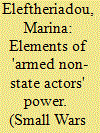

|
|
|
|
|
| Publication |
2014.
|
| Summary/Abstract |
Over the past few years there is an apparent re-regionalization of al-Qaeda activity, intensified by the ongoing Middle East turmoil. Its main characteristic is a trend towards the abandonment of focoist strategies and their replacement by more popular-based ones. This article aims at evaluating their capacity to implement such a strategy shift and sustain the required level of violence. As a means of evaluating this capacity, this article proposes the use of a DIME (diplomatic, informational, military, and economic) framework, which will hopefully provide an alternative angle of theorizing and understanding 'armed non-state actors' (ANSAs). The model is applied in the case of al-Qaeda in the Arabian Peninsula (AQAP), which appears to have effectively developed the military and informational dimensions, due partly to its own prowess and partly to the Yemeni state's weaknesses and the shortcomings of counterinsurgency. In contrast, the economic and diplomatic dimensions suffer from the lack of resources and the anti-systemic nature of AQAP.
|
|
|
|
|
|
|
|
|
|
|
|
|
|
|
|
| 7 |
ID:
131976
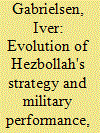

|
|
|
|
|
| Publication |
2014.
|
| Summary/Abstract |
This article fills a gap in the research on Hezbollah by evaluating their military performance from their formation in 1982 and up till the 2006 Israel-Hezbollah War. This study tests the theses that Hezbollah had developed a very strong tactical proficiency in the late 1990s and that there are more similarities in their strategy and tactics during the 2006 war and the 1982-2000 insurgency in Southern Lebanon than previously assumed. Another central theme of this article is how Hezbollah has been constantly adapting and evolving for the duration of its existence.
|
|
|
|
|
|
|
|
|
|
|
|
|
|
|
|
| 8 |
ID:
131983
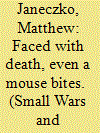

|
|
|
|
|
| Publication |
2014.
|
| Summary/Abstract |
This article analyzes the motivations behind individuals who chose to adopt terrorist methods in the Chechen conflicts of the late 1990s and early 2000s. While the seemingly obvious motivation in joining in a 'religious' war of jihad would be a strong belief in that religion, the reality is more complicated. The motivations behind these individuals were not only religious, but cultural, social, and political. This indicates that while the methods and ideological rhetoric adopted by Chechen terrorists prove similar to methods adopted by terrorists across the world, the fundamental causes and drive behind these terrorists are actually quite distinct and unique from others.
|
|
|
|
|
|
|
|
|
|
|
|
|
|
|
|
| 9 |
ID:
131986
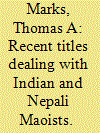

|
|
|
|
|
| Publication |
2014.
|
| Summary/Abstract |
A joint publication of the International Work Group for Indigenous Affairs (IWGIA) and Bindrai Institute for Research Study and Action (BIRSA), this treatment reads as a cross between a Zapatista manifesto and useful scholarship. It is worth quoting in full the cover blurb, because it illustrates well an approach which emerges in perhaps a majority of the works on Indian Maoism: 'The basic line of inquiry concerning the issues (dispossession from life supporting resources of land, forest, water and identity), the main cause (internal colonialism) and the remedy (provision of autonomy), has been discussed by leading social scientists and activists. In the process can be seen emerging a development critique with an alternative provided by the tribal/indegeous [sic] perspective aimed at reconstructing a society based on equality; economy based on cooperation, caring-sharing conservation, subsistence and decentralization; a policy based on conscience democracy [sic] and art based on collective participation and enjoyment.
|
|
|
|
|
|
|
|
|
|
|
|
|
|
|
|
| 10 |
ID:
131977
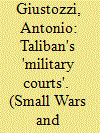

|
|
|
|
|
| Publication |
2014.
|
| Summary/Abstract |
The Taliban's 'code of conduct', which lists rules of discipline for the fighters, has been widely discussed, but do the Taliban try to implement it? This article discusses the structures that the Taliban have put in place for this purpose and their evolution over the years. It assesses that while the Taliban's 'military justice' system is still work in progress, the fact that it has attracted a significant investment in human resources bears witness to a serious intent of the leadership. However, the Taliban's concern with the behaviour of their fighting force is driven by their own political calculus, not by any sympathy for the international law of conflict.
|
|
|
|
|
|
|
|
|
|
|
|
|
|
|
|
| 11 |
ID:
131981
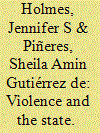

|
|
|
|
|
| Publication |
2014.
|
| Summary/Abstract |
Whether or not Colombia has improved is a controversial topic. If improvement has occurred, what, if any, lessons from the Colombian model can be learned? The first lesson is that Colombia's problems were caused more by a weak state than by drugs. The second lesson is that improving state capacity requires more than just increased security. The state must also provide the basic social services that citizens require to gain and maintain their support. Additionally, government institutions need to improve their professionalism, protect human rights, and root out impunity and corruption. The alternative is to suffer from new cycles of violence as old foes are vanquished, but new ones emerge.
|
|
|
|
|
|
|
|
|
|
|
|
|
|
|
|
|
|
|
|
|